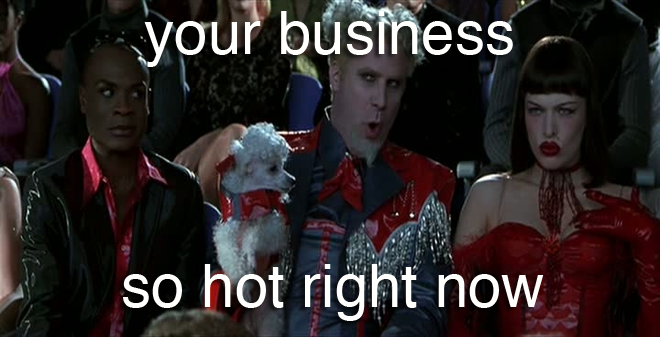Tagged: Business Development
Setting Intentions for 2017
- by Alyson Shane
2016 was a whirlwind year, and now that I'm home from our holiday trip to Windsor to visit John's family I finally have a little time to think, reflect, and plan my next moves for the coming year.
I'm not a big believer in "resolutions" to be honest; I prefer to look at each new year as an opportunity to commit to doing more positive things in general, rather than saying "this year I'll read 50 books!" or "I'm going to enter a bodybuilding competition in 2017" (lols for days).
Below are a few of the intentions I plan to set for the coming year, and some tips to help you set (and really work towards!) your own:

Do more yoga
A few months ago my friend Jackie and I went to Moksha Yoga Winnipeg for some hot yoga, and as I sweated and strained I felt the same kind of runner's high that I sometimes feel during a particularly good run. I left the class feeling renewed, exhilarated, and sweaty as hell, and it was wonderful.
Since then I've been trying to work doing yoga into my regular workout routine; I've been doing this easy 10-minute video at home during my 'lunch break' each afternoon. It's fast, simple, and a good way to break up my workday and spend a few minutes in a (somewhat) zen-like state.
In addition to all the feel-good mental benefits associated with doing yoga it just feels good to connect with my body and stretch out muscles that I don't normally use while sitting at my desk typing to you.
Your turn
Do you have any fitness goals in the coming year? Whether it's taking up running, swimming every day, or just stretching more during your linch break, here are some things to keep in mind:
- Costs. How much are you spending on fitness already? Are you willing to spend more? If you need special equipment, are you willing to invest additional funds?
- Time. Ask yourself honestly: how much time will this take each day, or week? Include travel time, changing, showering, etc in your estimate.
- Other obligations. Saying "I'm going to go to the gym every day!" is great in theory, but harder in practice. Block an average workweek out by hours, including commuting, meal prep, and other daily tasks to see how much time you reasonably have to meet your goals.
Delegate more (effectively)
One of my biggest learning moments came last year when I found myself looking dejectedly at the Crowdfunding Crash Course ebook I had been putting together. I'd spent heaps of time compiling the existing interviews, blog posts, and a bunch of extra goodies into an ebook format, only to totally and utterly lose steam when it came to designing the layout, which I didn't want to do.
I kept putting off the thing I didn't want to do until it felt like I'd put it off too long and the project felt irrelevant. I beat myself up really hard over it, and it's hard even admitting that I let it stagnate. However, it taught me an invaluable lesson: delegate tasks you don't like to the people who can do them for you.
That's why of my personal and professional goals is to delegate more of my workflow to others, and to learn to do so more effectively. Delegating properly and supporting the people who you work with means developing the proper systems to manage everyone's time and keep things on track, which I need to spend more time doing this year in order to meet this goal.
Your turn
Whether you're working in an office, a stay-at-home mom, or a busy business owner, knowing where you need help and asking for it can go a long way towards good mental health. Below are some things you can ask yourself before you start pushing to-dos off your plate:
- What tasks or processes do I enjoy doing the least? We tend to put off and procrastinate on tasks that we don't enjoy. Identify the ones you like the least (doing your taxes, following up with clients, etc) and find people who can help you do them.
- Ask: can I trust this person to do a good job? Take time to talk to and properly vet anyone you're thinking of delegating a task to, especially if it's a business-related one.
- Let go. If you believe that you can trust someone to help you manage your to-dos then trust in their abilities and don't stress too much. Make sure to review everything they do, but give them the space and support to do it properly.
 (ooooh yeah, the new year means motivational images like crazy)
(ooooh yeah, the new year means motivational images like crazy)
Spend more time on business development
This dovetails into delegating more effectively; when you run your own business and are managing client expectations, pitching ideas, going to meetings, writing copy, and doing all of the other day-to-day tasks that involve running a business it can be easy to forget about the most important business you manage: your own.
I've asked many mentors and friends about this, and they all agree: the first thing to slip when you start getting busy is your own business development. However, ongoing business development is critical when it comes to long-term success, and in 2017 and the following years I want to make more time to focus on building my business as well as my clients' businesses.
Some steps I want to take in this area are:
- Redefining "work". Most people look at business development as work, but writing and being creative are things that I enjoy, and I need to start re-framing business development as things I like doing in my leisure time when I'm not taking care of clients.
- Delegate more effectively. This deserves a second mention because I struggle with it and it will be essential to finding time for business development. Being too busy blocks my creative process.
- Work in inspiring places. Sitting at home with my laptop on a Saturday afternoon feels a bit boring, so getting out to coffee shops and bars where I can sit and work outside of the house will help me feel invigorated and encourage me to be creative.
Your turn
While my focus is on business development, the steps below are designed to help anyone with a creative passion that often takes a backseat to other things in life:
- Assess the benefits. Write down the benefits of spending time on your project. Some benefits could be "improve my craft or practice", "move my business forward", "earn more revenue" etc.
- Schedule in time. I talk about scheduling a lot because it is the most important way to stay on track. Look at your calendar and block out time to work on your projects or hobbies, and stick to them.
- Find mentors and inspiration. Talk to other like-minded people in your field, join an active Facebook group for people with similar interests, and read blogs and books about your passion or hobby to stay inspired.

Read more books
One of my favourite things to do is start my workday with a thermos of coffee and the front page of HackerNews (among others). I spend 20-45 minutes every day reading articles, bookmarking important information, and adding to my list of resources.
However, as many of you know there's a big difference between reading several articles a day and reading a good, old fashioned book.
Last year I read about a dozen books, which is pretty good, but I read pretty quickly and honestly there's no excuse other than I've chosen to prioritize other things. This article about finding time to read was a bit of a slap in the face, and has helped me decide to make reading physical books a priority this year.
Your turn
Making time to read more can be challenging (believe me) but below are a few things you can do to make more time to sink into a juicy novel or two over the coming months:
- Schedule in time to read. I find that it's easiest for me to make time to read before bed, after my day is done and I can relax. If this doesn't work for you, make a point to read on your lunch break, during your commute (if you don't drive) or over your morning coffee.
- Make a list of books you want to read and review it often. Fill your list with books by people you admire, interesting fiction (reading fiction makes you a better person), and books that capture your interest and which you are genuinely excited to read.
- Prioritize reading. It's easy to get sucked into an Instagram black hole or get swept up with the latest mobile game, so put your phone face down and store your laptop out of view. Focus on your book (or e-reader) and nothing else for as long as you can. Trust me, it'll be hard at first but the more you do it the longer your attention span will get.
Forgive more readily
Forgiveness is hard. It's easy to stay mad at people, or to hang on to hurt feelings and resentment. I told my therapist today "it's easier to be angry than it is to empathize with someone" and it's true, but hard things are the things worth doing because they make us better people in the long run.
2016 was the year that I started to learn to forgive people: my parents and family who failed me, people who hurt my feelings, acquaintances or strangers who spoke or acted thoughtlessly, and, most importantly, myself. I started to learn to forgive myself.
With that in mind I'm going to do my best to be a positive influence on those around me, and to learn to forgive more easily and not hold onto anger, resentment, and guilt.
Your turn
It seems like everyone has an axe to grind with 2016; whether it's the loss of a favourite celebrity, a personal issue that you haven't resolved, a conflict with a coworker, or something else, below are a few ways you can move towards forgiveness this year:
- Accept that you can't change people. Many of us spend heaps of time stressing and worrying about other people (myself included) but the key to letting go is to accept that you can't change how people think, feel and act. You can only do the best you can and hope that others understand your actions.
- Stop creeping. Social media has made it easier than ever to "check up" on people, but opening up that Incognito tab only helps hold on to any negative feelings you may be harbouring. It won't make you feel any better, so just don't do it.
- Recognize that you're doing the best you can. You aren't perfect. You'll say awkward things, unintentionally hurt other people's feelings, and misstep because you're human. It happens, so do your best to say "I made that mistake, but now I know and I can do better next time."
What are your intentions for 2017? Tweet at me or comment below and let me know what you're doing in the coming year.
How to Create a Value Proposition That Stands Out From the Crowd
- by Alyson Shane
One of the cornerstones to running a successful business is having a strong value proposition.
Not sure what the heck a "value proposition" is? Here's a breakdown:
- It explains how your product or service solves your clients’ problems
- It highlights specific benefits of working with you
- Explains why working with you is a better option than working with your competitors
Understanding these three key things can go a long way towards building your business, helping you find and retain the kinds of clients and customers you want, and goes a long way towards quoting accurately and not selling yourself short (which many people I meet tend to do, it seems).
Despite it's importance, many of the people I've met either don't know how to create one, or don't understand the steps to creating an effective one which helps their business forward.
Today, we're going to fix that:
Understanding Your Value
This is tougher than it sounds. For many of us (myself included) our businesses happen as the result of a series of opportunities which may leave us feeling unprepared and confused. This is normal.
When I first started out I knew a few things: I knew what I loved to do (writing, content marketing, and community management) and I knew why my clients wanted to work with me (strong writing skills, good attitude, deep knowledge of my industry), but I struggled to clarify what the value of what those things actually meant to my clients. This takes some serious thought and reflection, and it's okay if you don't know right away.
Some things to ask yourself are:
- What am I exceptionally good at?
- What makes me and my business unique?
- What does a one-sentence summary of how I help my clients/customers look like?
Get to Know Your Ideal Client or Customer
Take a step back from your own train of thought for a second and think like your ideal client or customer, then ask yourself the following questions:
- What do they do?
- What kinds of problems do they have that I can help solve?
- How can my services or product help make their lives easier?
- What do they value?
Not sure how to answer these questions? Ask and do some market research! You can accomplish this in a variety of ways: conducting a Twitter poll, asking friends and colleagues, talking to your mentor - the sky's the limit!
Creating an Eye-Catching Value Proposition
Business is about being different. The more you can stand out from your competitors, the stronger your value proposition will be.
Here's what my value proposition looks like:
I help brands and businesses create long-term content marketing strategies which help them convey the right message to their target audience.
Let's break this down:
- I've identified the kinds of clients I want
- I've stated the kind of work I want to do (copywriting, content marketing, and social media management)
- I've described the kinds of working relationships I want (long-term ones)
- I tell prospective clients how I help them (increasing brand awareness and community growth)
Creating a value proposition which states what you do, what makes you different, and the kinds of clients and working relationships you want to have doesn't just tell your clients about what you do, but it also helps you determine if a potential client or customer is the right fit for you, saving you time in the long run.
Adding Social Proof

Do you have any accomplishments that you're proud of?
Maybe you were published in your local paper, received an award for excellence in your field, or spoke at a conference - whatever it is, feel free to weave these into your value proposition when you can.
This is called "social proof" and is designed to add to your value proposition in terms of concrete examples of how awesome you and your business are.
You can add things like "voted #1 in my field" or "nominated as 2015 Canadian copywriter of the year" - whatever it is (as long as it's true!) can go a long way to adding weight to your value proposition.
Now it's your turn!
Ask yourself what you want to do, how you'll do it, and how your approach makes you different than other people and businesses in your industry. Got questions? Leave them in the comments or drop me a line!
